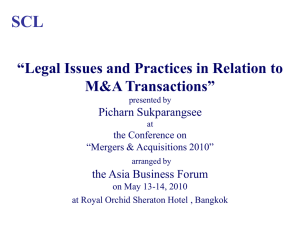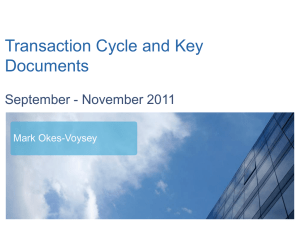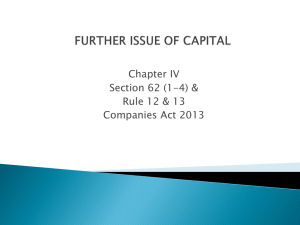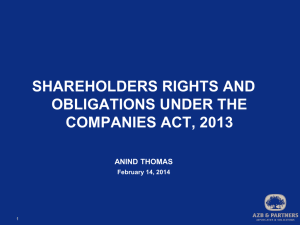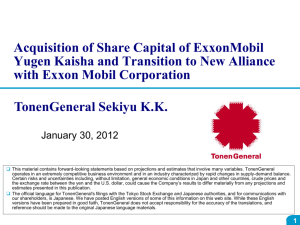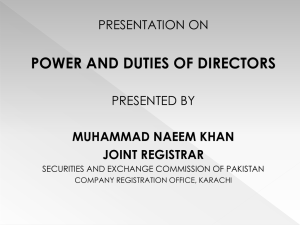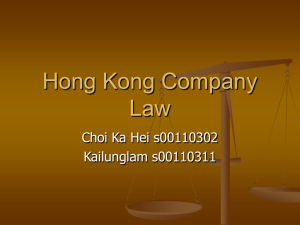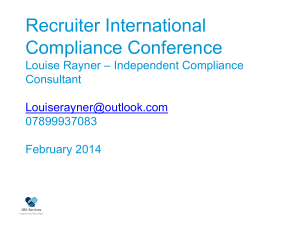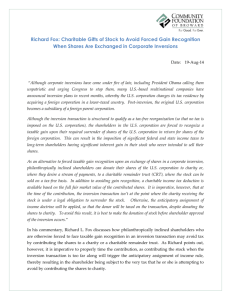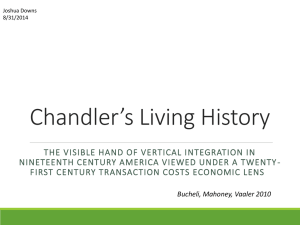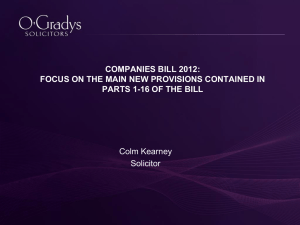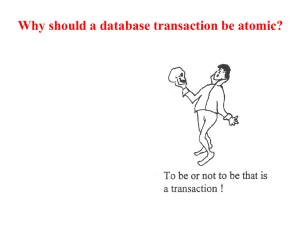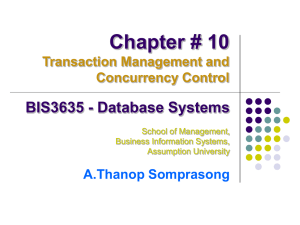Change of agreements
advertisement
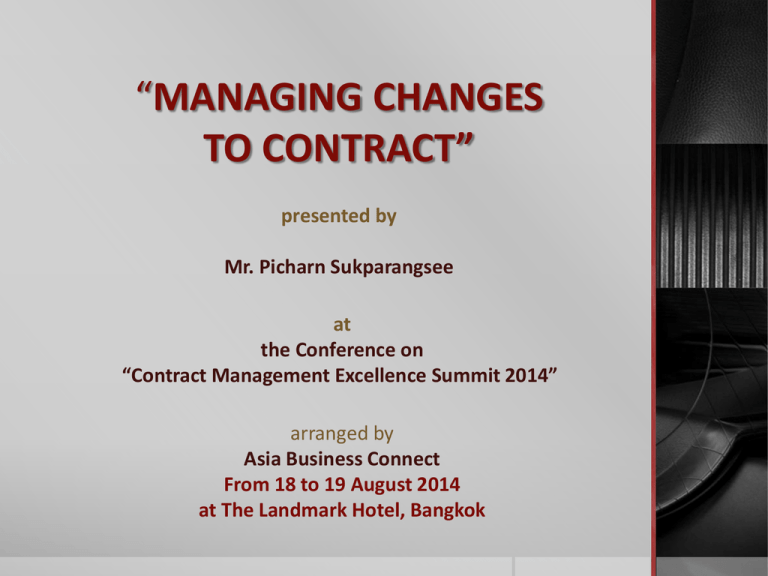
“MANAGING CHANGES TO CONTRACT” presented by Mr. Picharn Sukparangsee at the Conference on “Contract Management Excellence Summit 2014” arranged by Asia Business Connect From 18 to 19 August 2014 at The Landmark Hotel, Bangkok Structuring transaction • Business • Finance • Legal • Tax Preparation, Negotiation and conclusion of legal documents • MOU, term sheet, head of agreement • Preparation, negotiation and conclusion of any agreement Change of agreements Review commercial terms Advise on structure of transaction in legal and tax aspects What are differences between a contract and an agreement ? Consideration is not required under law of Thailand. Rule of Thump A standard form of agreement can be changed. A draft of an agreement can be changed. An agreement may pass negotiation, preparation and revisions but no execution. Changes to a draft of agreement are made by way of revisions and amendments. Name of an agreement reflects nature of the matter. Agreement as executed may not be delivered. Can exchange of agreement by way of e-mails between parties to an agreement be legal, valid and effective under law of Thailand ? Signed agreement by fax may result in some legal dispute. In certain circumstances, resolution of the board of director meeting or a general meeting of shareholders should be sought. A party to an agreement is important for the time of execution of an agreement and enforcement of an agreement. Power of any party and authorization of any authorised signatory of any party for an international transaction should be checked. Bargaining power is crucial in negotiation and conclusion of an agreement. An accession to an agreement should be made for a third party to be a new party to an agreement. One party is not an agent or a joint and several partner of the other party. Entire agreement excludes prior agreement and correspondences. Waiver of any pre-emption rights to the sale shares is important in the case of sale and purchase of shares. Transfer of shares and payment for shares are crucial in share sale and purchase agreement. If partial transfer of shares as opposed to entire transfer of shares are made, what problems can occur ? Validity of transfer of shares between a seller and a purchaser is different from validity of transfer of shares against a third party. Securities and exchange law should be taken into consideration in respect of acquisition of securities of a listed company. A merger of two business may require approval under competition law. Scope of work is determined and changed. An authorized share capital of a foreign company may be minimal. Can one party demand increase costs from the other party ? A country may have different stock exchanges. Floating charge law is not enacted into Thai law. Only a bill of floating charge law is pending for so many years. Trust law does generally not exist in laws of Thailand. Share purchase and asset purchase must be structurally designed. A material adverse change in an agreement is seriously discussed. Due diligence is conducted to reduce, if not totally exclude, risks. What types of shares should be purchased ? Capital gains from share sale may be subject to tax. Different prices for share purchase should be discussed and concluded. How are shares transferred ? Provisions on transfer of shares should be changed How is the payment made ? Price may be gross price or net price. Can an agreed price be changed ? Which one of transfer of shares and payment for the shares comes first ? Should payment be made by way of banker’s draft, cashier’s order, transfer of fund or by any other means of payment. What are core assets and non-core assets of a company? Does a sale covers an exchange, a transfer, a disposal and a sale and buy back ? Dividend policy including a minimum percentage of dividend should clearly be set out. What effects will have for payment of share dividend, not cash dividend ? How does an escrow account come into play ? No payment may lead to suspension of performance of obligations. No additional capital expenditure should be occurred from the date of execution of an agreement to the date of closing. Due diligence exercise must be conducted prior to the closing and the result of the due diligence should be satisfactory to a purchaser. Prompt disclosure for any significant change of a target company should be made by a seller to a purchaser. No dividend or distribution of profit should be declared or made before the closing date. Day-to-day transaction of a target company is made and each of transactions shall be made on an arm’s length basis. Directors Notice, quorum and resolution of the board of directors meeting of company may be problems if not carefully reviewed. In Thailand, each of director is required to attend a meeting of the board of director in person. A mere written resolution of the directors and an alternate director are not legal in Thailand. An agreement should set out matters to be approved by the board of directors meeting. Shareholders It is important to determine authority to issue notice, quorum and voting at a general meeting of shareholders. Matters to be approved by the general meeting of shareholders should be clearly determined in an agreement. Can a general meeting of shareholders of a company continue with the meeting after the meeting was adjourned by the chairman ? How are dividends paid out of the Company ? How does a deadlock matter arise ? Should a mediator or arbitrators be preferable ? An agreement should clearly set out accounts. No additional employment is made by the target company unless a prior approval of a purchaser is obtained. A threshold of any permitted transaction may be disputable. Closing of a transaction may not necessarily mean completion of a transaction. Some licenses can be transferred while other licenses may not be transferred. Put option and call option may be exercised by either of the parties. Risk of title of property can pass at the time of execution of an agreement or at the time of delivery of the property. Legal and beneficial ownerships do not recognize under law of Thailand. Some of representations and warranties should be changed. Approval of a transaction by resolution of the board of directors meeting or a general meeting of shareholders, if required, must be obtained. Senior, junior, secured, unsecured and subordinated debts should be carefully reviewed. What types of security should be demanded. Property is distinguished from assets. Property is free from mortgage, pledge, lien and other encumbrances. Issues on pledge under laws of Thailand should be aware. Financial statements shall be prepared in accordance with international accounting standards or generally accepted accounting principles. Annual Financial statements and quarterly financial statements shall be audited and reviewed respectively. Updated management accounts should be requested for any M&A transaction. Actual and potential legal disputes including litigations and claims should be looked at. Subordinated debt is inferior to senior debt. Representations and warranties should be reviewed and revised. Representations and warranties should be correct, true and accurate in all respects. Undertakings are necessary for continuing obligations. All reasonable endeavours or to the best of knowledge is different from firm undertaking. Can only one party have the right to assign an agreement to a third party ? What are exceptions of assignment in an agreement ? The scope of non-competition clause including details of businesses and a period should be reviewed. Is an agreement required to be affixed with stamp duty ? What happens if both parties are in breach of provisions of an agreement ? Tax implications may require change of agreement. Should a seller or a purchaser pay any taxes on a transaction ? What kind of taxes shall be payable on a transaction ? Maintaining or dismissing executives and employees should be clearly set out. Land and building are subject to a lot of laws and regulations on real estate. Environmental issues and environmental impact assessment report shall be taken into consideration for acquisition of any business with any factory. Indemnification clause is disputable. Exclusion or limitation of liability may not be enforceable. Set-off may face difficulty. What is force majeure ? Force majeure witnesses opposite interpretations between different parties. Potential event of default may cause extreme consequences if not carefully perused. A threshold of an event of default may be problematic. An insolvent event may be differently interpreted. Illegality event may vary from one country to another country. Can an agreement be terminated without any cause of termination ? Can an agreement be terminated by an occurrence of an event of default ? It is possible to have occurrence of an event of default but the agreement is not terminated. Which party has the right to terminate the agreement ? • What happens if both parties are in breach of provisions of an agreement ? • Should a remedy period be available in a case of occurrence of an event of default ? • What is a material adverse change and how is it interpreted ? • How is an agreement really terminated or deemed to be terminated ? • Can only one party be entitled to terminate an agreement ? • Should termination of one agreement automatically trigger termination of another agreement? Termination of an agreement does generally distinguish obligations. After termination of an agreement, some provisions of an agreement will survive. • What is default interest to be chargeable after termination of an agreement ? • In what circumstances, can compound interest on the due and outstanding debt be made ? Choice of laws Can law of a third country govern a transaction between a first company incorporated in the first country and a second company incorporated in the second country ? What aspects of law are governed and construed under an agreement ? Is equity law enforceable in Thailand ? Is arbitration or litigation preferable ? Does governing law govern all aspects of an transaction ? Some provisions of foreign law are not applicable in Thailand. Problems on litigation and potential litigation can occur in any jurisdiction. Judgment of a court of one country is not enforceable in a court of another country. A process agent is required for litigation in a foreign country. Arbitrators may apply differently substantive law and procedural law. Enforcement of the judgment and an arbitral award may face failure. Discrepancies may occur between an agreement in local language and a translation into a foreign language. Foreign Corrupt Practice Act and Bribery Act come into play in a new agreement. Can business ethics be enforceable under a legal agreement ? Problems after completion of a transaction • • • • • • • Off-balance sheet debts or hidden debts Bank account Unaudited financial statements Tax return not filed License expired Insurance policy not renewed Corporate documents such as minutes of the board of directors and general meetings of shareholders missing Legal issues should be handled by legal advisors Case Study • Joint venture companies • Business Rehabilitation companies Thank you for your kind attention. Mr. Picharn Sukparangsee SIAM CITY LAW OFFICES LIMITED 20th Floor, Rajanakarn Building, 183 South Sathorn Road, Bangkok 10120, Thailand Tel: (662) 676-6667 – 8 Fax: (662) 676-6188-9 E-mail : picharn@siamcitylaw.com



